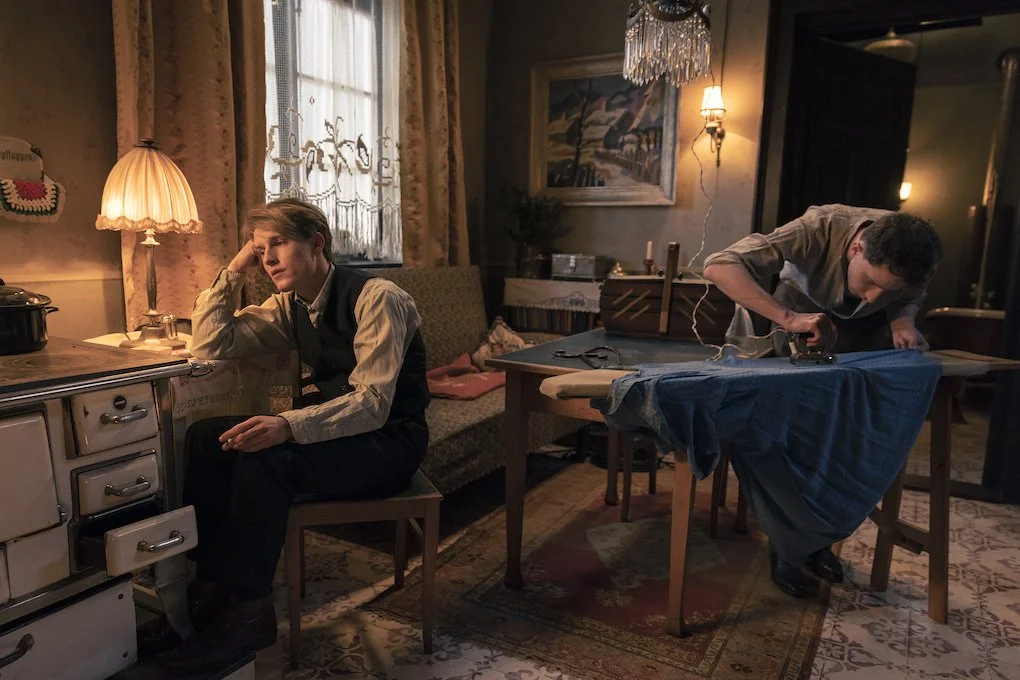Fake It to Make It
Saviour, refugee and opportunist. Maggie Peren’s Cioma Schönhaus biopic paints the WWII survivor as all of the above.
The Forger
Director: Maggie Peren • Writer: Maggie Peren, based on the memoir by Cioma Schönhaus
Starring: Louis Hofmann, Luna Wedler, Jonathan Berlin, Marc Limpach, Nina Gummich
Germany • 1hr 56mins
Opens Hong Kong September 21 • IIA
Grade: B
It takes quite a while for The Forger (Der Passfälscher) to get with the forging, which is a shame. Because when it finally does, it becomes not just a wartime survival drama about a few decent Germans trying to prevent the murder of fellow citizens, but also a black comedy with a modern spin. The main character, a one-time graphics student-turned-document forger, is essentially a twentysomething opportunist who grabs the bull by the horns and turns lemons (the Second World War, the Holocaust) into lemonade. He forges (see what I did there?) a semi-glamorous life for himself out of the scraps of his shit circumstances. He surrounds himself in artifice and uses that artifce to insert himself into ruling society. He’s what we now know as an influencer.
Writer-director Maggie Peren must be given credit for defying typical Holocaust film narrative by making Cioma Schönhaus (upon whose memoir this is based) equally defiant. He’s been targeted for the most hideous execution imaginable but he refuses to go quietly – if at all. He’s educated, and skilled, and it’s enjoyable to watch him outsmart his oppressors in many ways, match their arrogance with his own and sometimes use their laws against them. But there are two odd elements at play in The Forger: making black comedy out of the Holocaust is tricky. At best. But if you’re going to, get with the forging and outwitting sooner, especially if you’re going to make your film about that rather than interrogate the vagaries and inherent contradictions of Schönhaus’ ruse.
In the Berlin of 1942, German Jew Cioma (Louis Hofmann, the kid who kept moving through tunnels and time in Netflix Germany’s Dark) is hiding in plain sight. Brash and seemingly oblivious to the consequences of his actions, Cioma has forged himself post office papers, an official Nazi document that allows him to move freely about the city – shot in steely greys and conspiratorial browns by DOP Christian Stangassinger. He rides the bus to his job at a munitions factory, which has earned him a legit exemption from the death camps his parents have already been sent to, but then he turns around and dines in the city’s remaining restaurants, right alongside the Gestapo types that inventoried the contents of his flat. What remains he sells to the highest bidders, knowing Germans hate Jews, but have no qualms about buying their nice stuff, cheap. One day a co-worker tells him about a job with Franz Heinrich Kaufmann (Marc Limpach), a lawyer and member of the anti-Nazi Confession Church, who pays him in food vouchers to forge passports and help sneak Jews out of the country. Of course Cioma gets cocky, a little careless, and a time comes when he has to forge a passport for himself and for Gerda (Luna Wedler), the young woman surviving the war in her own way he’s started an awkward romance with.
There’s lot of territory in The Forger that Peren doesn’t bother to venture into, which keeps the film in the middle of the road when it could have gone all the way to the absurdist side of the street. This is, at its core, a “passing” story: think Europa Europa, Devil in a Blue Dress, and, uh, Passing, but Peren never wonders how Cioma feels about faking Aryan status. That said, there’s a middle finger charm to the story, particularly when Cioma ropes his pal Det (Jonathan Berlin) into his scheme. Det’s a tailor, and his sewing skills get them nice shiny German SS uniforms and entry into officers’ clubs. Bold! Cioma plays with his landlady Mrs Peters’ (Nina Gummich) covetous side and frequently tries her patience. She’s a “good” German. That’s dangerous! But hey. No risk, no reward.
Point is, The Forger spends a lot of its time being clever in its tone, leaving no room for questions about where to draw moral lines. Kudos to Peren for making Jews actors in their own salvation, but she’s backed herself into a corner; any contemplative side would clang with the absurdity, as well as with the truncated cloak-and-dagger action of the third act. It makes The Forger something of a mixed bag: strong in flashes but never quite sure what it wants to be. Schönhaus famously escaped Germany with forged papers. By crossing the border into Switzerland, Dressed like a German officer. On a damn bicycle! Where the hell is that, because that’s what The Forger should have been. Talk about absurd. — DEK



